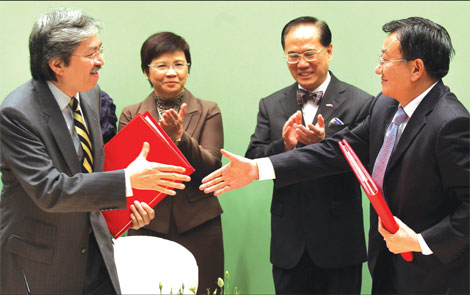HK, mainland liberalize more cross-border trade in services
Updated: 2010-05-28 07:29
By Oswald Chen(HK Edition)
|
|||||||||
|
Chief Executive Donald Tsang (back right) applauds as Financial Secretary John Tsang (front left) shakes hands with Vice-Minister of Commerce Jiang Zengwei after signing the 7th supplementary agreement of the Closer Economic Partnership Arrangement between Hong Kong and the mainland in Hong Kong Thursday. Edmond Tang / China Daily |
35 market liberalization and trade and investment facilitation measures in 19 sectors to take effect in 2011
The Hong Kong SAR government and the central government Thursday signed the 7th supplementary agreement of the Closer Economic Partnership Arrangement (CEPA) between the special administrative region and the mainland, further liberalizing trade in services between the city and the mainland.
Witnessed by Chief Executive Donald Tsang as well as other local and mainland officials, the signing was executed by Financial Secretary John Tsang and Vice-Minister of Commerce Jiang Zengwei, who signed the agreement on behalf of the city government and the central government, respectively.
The new pact, which will take effect January 2011, provides for 35 market liberalization and trade and investment facilitation measures in 19 sectors. "Technical testing, analysis and product testing" and "specialty design" are the new sectors that will benefit from the new pact, bringing the total number of liberalized service sectors under the CEPA to 44.
The new agreement "demonstrates the full support of the central government for the services sector of Hong Kong. We hope that we can further expand the scope of liberalization to more sectors so that both parties can create a win-win situation," Donald Tsang said after the signing ceremony.
"As the mainland can give more support to Hong Kong in service liberalization, the agreement delivers vast market potential to Hong Kong service providers in various sectors. We envisage that both parties can cooperate in exploring more international market expansion under the framework of the CEPA," Vice-Minister Jiang said.
The local banking, tourism, aviation, medical services and other professional services sectors all benefit from the new pact in varying degrees.
Concerning the banking sector, Hong Kong banks will face fewer hurdles in applying for the status of wholly foreign-funded banks on the mainland. They will also find it easier to apply for authorization to conduct renminbi (RMB) business and financial services provision to small enterprises on the mainland.
On securities, both sides will deepen cooperation in financial services and product development, and Exchange-Traded Funds (ETFs) tracking the price movements of Hong Kong listed stocks will be launched in the mainland stock market at an "appropriate" time.
Operators in the asset management sector welcomed the new measures on the financial services sector, citing great potential in boosting development in the industry.
"The launch of Hong Kong-linked ETFs on the mainland can help enhance the turnover of the local stock market. If the launch does not involve big changes in the financial regulations on the mainland, I anticipate the launch can be materialized pretty soon," Dr. H.S. Tang, investment director of BOCI-Prudential Asset Management, told China Daily.
"The measure that allows Hong Kong banks to operate RMB businesses on the mainland more easily is a breakthrough. The pace of the development depends on how the players can adjust to the new business environment," Tang added.
On tourism, Hong Kong-based travel agencies in Beijing and Shanghai can organize group tours to Hong Kong and Macao for residents of Beijing and Shanghai. In addition, Hong Kong-based air transport sales agencies will be allowed to sell domestic air tickets on the mainland. Hong Kong-based aircraft repair and maintenance service providers are, under the agreement, also allowed to operate relevant services on the mainland.
Hong Kong medical service providers, meanwhile, are allowed to establish wholly-owned hospitals in Shanghai and Chongqing, as well as in the southern provinces of Guangdong, Fujian and Hainan. Twelve types of statutory healthcare professionals, who are registered to practice in Hong Kong, are allowed to provide 3-year short-term medical services on the mainland.
Since the inception of the CEPA, the agreement has brought tremendous benefits to both Hong Kong and the mainland, Chief Executive Tsang said.
"From 2004 through 2009, the cumulative business revenues of service companies in Hong Kong due to the CEPA from mainland-related business reached HK$61.6 billion. Under the CEPA, the Individual Visit Scheme (IVS) brought over 49 million mainland tourists to Hong Kong by March 2010. And by the end of 2009, 54,700 jobs were created locally due to the CEPA and IVS," the chief executive said.
China Daily
(HK Edition 05/28/2010 page3)
